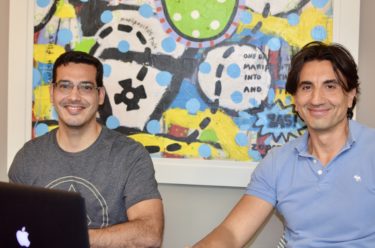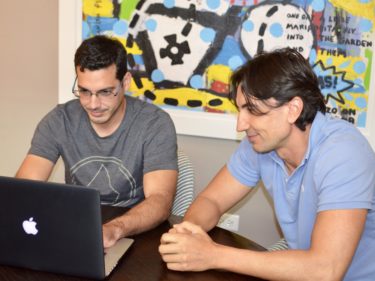Healthcare in the US is unquestionably a complex issue. Despite the president’s previous remarks, healthcare has been a complicated matter for many years, dividing the political spectrum and the American people. Given the complexity of this issue, it should come as no surprise that it will take the brightest of minds to find a solution.
However, when we think of intelligent individuals working away to solve the issues of the US’ healthcare system, physicists are not usually a demographic that comes to mind, but for Abartys Health, a centralized data hub for insurers, doctors, and patients that aims to reduce the $750 billion annual loss in the U.S. healthcare market, these scientists could be the key.
To get a better idea of how this science could save the global healthcare crisis, we spoke with Jesuan Betancourt and Julian Velev, two physics PhDs from Puerto Rico who are integral members of Abartys Health.

Jesuan Betancourt and Julian Velev
What first attracted you, as physicists, to work in healthcare?
Jesuan: It is really difficult to see the impact of your work in physics. At least in my case, I wanted to see my work have an immediate impact on society. Especially in the new age of data, I think there is a lot of work to be done in healthcare.
Julian: It was not really a choice. The stars aligned this way — [Lauren Cascio, co-founder of Abartys Health] involved me in the project. What has kept me involved is the challenge of learning new technology and producing something ‘non-trivial’.
Moreover, what made you choose Abartys Health over other options given the high demand for your skill sets?
Jesuan: I have never been exposed to another company with such an ambitious goal; the idea of democratizing healthcare, making data available to patients and helping insurance companies understand their populations. I knew it would not be easy, but it would be a new challenge. Technology has advanced so much, and the state of healthcare has fallen behind.
The idea of having accessible and affordable healthcare is so simple compared to other challenges, why is the system still so flawed? This type of challenge is good for a physicist. When I heard the company was gathering data to create a better health system, I was hooked on the challenge. Not only was it fun and new and exciting, I knew I could see the impact I was having.
In general, what way can physics add value to the field of healthcare?
Jesuan: Physicists are good at analyzing and finding patterns in data. This skill (much needed in healthcare) fits well with physicists because of the problem-solving nature of the discipline. In school, you are taught to solve complex problems.
Julian: Physicists add value because during our education we develop several skill sets such as math, computer literacy, and problem-solving. These are all skills that are important in any field including healthcare. I have (physicist) friends that work in other fields like finance and oil.
Julian, I can see from your Linkedin that you are well educated in high-performance computing and cloud computing. How do you think these two areas could help improve healthcare?
The future is obviously digital and computers will be involved in every aspect of everyday life, including healthcare. There are too many ways to enumerate how high computing can play a role in improving healthcare.
Examples:
At the extreme, replacing healthcare professionals.
A less extreme example is facilitating access to electronic health records.
Using data to identifying conditions before they happen, allowing healthcare to be preventative focused rather than reactive.
Involving new information into healthcare such as genome data leading to personalized medicine.
Jesuan on your Linkedin you state “Genius physicist that decided not to discover the secrets of the universe in order to fix healthcare!” Was there an epiphany moment that made you realize that healthcare was a more pressing issue for you?
Jesuan: The genius thing is a bit of a joke. In Physics the most noble thing one can do is discover the universe; changing my career path to something more pragmatic was a personal decision because I wanted to see my work help change an industry. More or less, this is the same sentiment as what attracted me to the industry.
(Originally posted on The Sociable)












